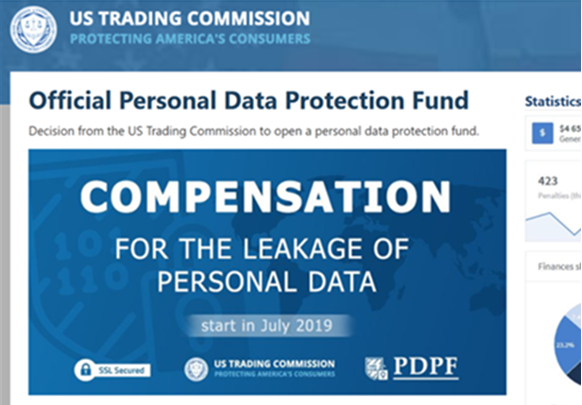Watch out: This FTC site promises you money after your data is leaked – it’s fake

Scammers have been duping unsuspecting victims out of their money by posing as a Federal Trade Commission website. The fake site goes by the U.S. Trading Commission’s name, which is not a real government entity.
Complete with the FTC’s official seal and address, it promises victims compensation if their personal data has ever been stolen. But the fake website is actually the one doing the stealing. Tap or click here for details on a nasty COVID vaccine scam.
With a flashy design and colors similar to the real FTC site, victims are asked for banking details and personal information to process bogus claims. Naturally, there is no compensation, and the scammers just want to steal your money.
How does the fake site work?
“The site says you can ‘instantly receive’ a cash payment by clicking on some links and giving the site your personal data and bank account or electronic wallet information. Of course, if you do that, your money will be gone,” explains Attorney Seena Gressin of the FTC’s Division of Consumer & Business Education.

Gressin also highlights that not only will your money be gone, but you could expose your device to malware. Cybercriminals will attempt to infect your personal computer with malware or viruses. This could let them take full control of your PC, use your information for identity theft and drain your bank accounts.
The FTC explains that the fake website pops up as a YouTube link and uses several URLs to redirect potential victims. While the FTC does fight against scam websites, there are several things that it won’t do:
- The FTC will never ask for money.
- The agency will never ask for your bank account or credit card number.
- The FTC will never ask for your Social Security number.
Gressin points out that if the FTC needs to send you money, it will be done through a mailed check.
Here are signs of a fake website:
- Check that the URL is the real address of the company, service or agency.
- Popular anti-virus and anti-malware software will alert you to potentially malicious sites.
- Check for small details that might be out of place, like spelling mistakes, small typos or grammatical errors.
- Most browsers can display a website’s security certificate. If there is a lock icon on the left of the search bar, click it and navigate to the certificate.
FTC does return some money from scams
In fact, the FTC has been so successful in thwarting criminal websites that it paid out over $483 million last year in compensation. Around 1.7 million people received a check from the FTC covering 50 cases.
The largest amount was around $300 million paid out to 142,000 people. This was related to a settlement with Western Union.
This fake website asks people to enter personal details. But the agency explained that it has a database of those eligible for a refund. The database includes reports people made to the FTC, Better Business Bureaus, and federal, state and local law enforcement offices.
You should always report suspected fraudulent activity to the authorities. “When you report a scam or fraud, you may help law enforcement, and yourself. For example, many people who reported sending money to lottery, romance, sweepstakes or other online scammers through Western Union got full refunds in 2020,” the agency explains.
To report fraud, scams and bad business practices, you can click here to go to the FTC’s dedicated fraud reporting website.
Keep reading
The best browsers for privacy at a glance
Stimulus check missing? Here’s how to report it to the IRS
Tags: banks/banking, compensation, cybercriminals, Federal Trade Commission, identity theft, malware, scams/scammers, security, Social Security number, viruses, YouTube
